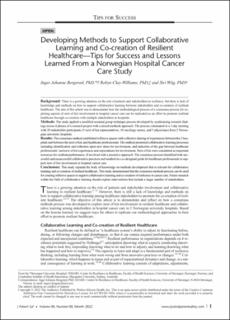| dc.contributor.author | Bergerød, Inger Johanne | |
| dc.contributor.author | Clay-Williams, Robyn | |
| dc.contributor.author | Wiig, Siri | |
| dc.date.accessioned | 2022-06-21T19:15:09Z | |
| dc.date.available | 2022-06-21T19:15:09Z | |
| dc.date.created | 2022-02-27T12:29:13Z | |
| dc.date.issued | 2022-01 | |
| dc.identifier.citation | Bergerød, I.J., Clay-Williams, R., Wiig, S. (2022) Developing Methods to Support Collaborative Learning and Co-creation of Resilient Healthcare—Tips for Success and Lessons Learned From a Norwegian Hospital Cancer Care Study. Journal of Patient Safety | en_US |
| dc.identifier.issn | 1549-8417 | |
| dc.identifier.uri | https://hdl.handle.net/11250/2999902 | |
| dc.description.abstract | Background
There is a growing attention on the role of patients and stakeholders in resilience, but there is lack of knowledge and methods on how to support collaborative learning between stakeholders and co-creation of resilient healthcare. The aim of this article was to demonstrate how the methodological process of a consensus process for exploring aspects of next of kin involvement in hospital cancer care can be replicated as an effort to promote resilient healthcare through co-creation with multiple stakeholders in hospitals.
Methods
The study applied a modified nominal group technique process developed by synthesizing research findings across 4 phases of a research project with a mixed-methods approach. The process culminated in a 1-day meeting with 20 stakeholder participants (5 next of kin representatives, 10 oncology nurses, and 5 physicians) from 2 Norwegian university hospitals.
Results
The consensus method established reflexive spaces with collective sharing of experiences between the 2 hospitals and between the next of kin and healthcare professionals. The method promoted collaborative learning processes including identification and reflection upon new ideas for involvement, and reduction of the gap between healthcare professionals’ and next of kin experiences and expectations for involvement. Next of kin were considered as important resources for resilient performance, if involved with a proactive approach. The consensus process identified both successful and unsuccessful collaborative practices and resulted in a co-designed guide for healthcare professionals to support next of kin involvement in hospital cancer care.
Conclusions
This study expands the body of knowledge on methods development that is relevant for collaborative learning and co-creation of resilient healthcare. This study demonstrated that the consensus methods process can be used for creating reflexive spaces to support collaborative learning and co-creation of resilience in cancer care. Future research within the field of collaborative learning should explore interventions that include a larger number of stakeholders. | en_US |
| dc.language.iso | eng | en_US |
| dc.publisher | Wolters Kluwer Health, Inc. | en_US |
| dc.rights | Attribution-NonCommercial-NoDerivatives 4.0 Internasjonal | * |
| dc.rights.uri | http://creativecommons.org/licenses/by-nc-nd/4.0/deed.no | * |
| dc.subject | helsefag | en_US |
| dc.subject | resiliens | en_US |
| dc.title | Developing Methods to Support Collaborative Learning and Co-creation of Resilient Healthcare—Tips for Success and Lessons Learned From a Norwegian Hospital Cancer Care Study | en_US |
| dc.type | Peer reviewed | en_US |
| dc.type | Journal article | en_US |
| dc.description.version | publishedVersion | en_US |
| dc.rights.holder | © 2022 The Author(s). | en_US |
| dc.subject.nsi | VDP::Medisinske Fag: 700::Helsefag: 800 | en_US |
| dc.source.journal | Journal of patient safety | en_US |
| dc.identifier.doi | 10.1097/PTS.0000000000000958 | |
| dc.identifier.cristin | 2005813 | |
| dc.relation.project | Norges forskningsråd: 275367 | en_US |
| dc.relation.project | SHARE - Centre for Resilience in Healthcare: 5091 | en_US |
| cristin.ispublished | true | |
| cristin.fulltext | original | |
| cristin.qualitycode | 1 | |

